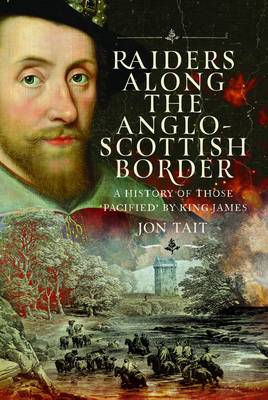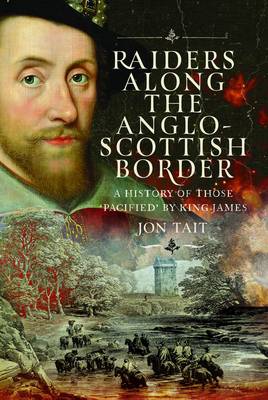
- Retrait gratuit dans votre magasin Club
- 7.000.000 titres dans notre catalogue
- Payer en toute sécurité
- Toujours un magasin près de chez vous
- Retrait gratuit dans votre magasin Club
- 7.000.0000 titres dans notre catalogue
- Payer en toute sécurité
- Toujours un magasin près de chez vous
Raiders Along the Anglo-Scottish Border
A History of Those 'Pacified' by King James
Jon Tait
Livre relié | Anglais
55,45 €
+ 110 points
Description
Like Gomorrah with horses - that's probably the best way to describe the stories of those inhabiting the heather-clad hills between England and Scotland who were strung up on gallows during the turbulent period of the border reivers and after, when King James I/VI attempted to 'Pacify the Border'.
The condemned here were cattle rustlers, counterfeiters, burglars, protection racketeers, thieves and murderers who rode in family-based gangs, terrorised the countryside on both sides of the dividing line, and were essentially the mafia of their time.
They were executed in places such as Edinburgh, Dumfries, Jedburgh, Hawick, Peebles, Selkirk, Berwick, Morpeth, Alnwick, Newcastle, Hexham and Carlisle in a period marked by conflict between the two great nations where their land became a warzone.
Anyone interested in the darker side of the history of the bloodstained border can trace the lineage of those families embroiled in criminal society from the Scottish Wars of Independence right through to the Acts of Union between the countries in 1707.
The March Laws that the border reivers lived under were finally ended in 1603 when King James ascended to the English throne following the death of Queen Elizabeth I - and the 'pacification' of the criminal gangs began.
The condemned here were cattle rustlers, counterfeiters, burglars, protection racketeers, thieves and murderers who rode in family-based gangs, terrorised the countryside on both sides of the dividing line, and were essentially the mafia of their time.
They were executed in places such as Edinburgh, Dumfries, Jedburgh, Hawick, Peebles, Selkirk, Berwick, Morpeth, Alnwick, Newcastle, Hexham and Carlisle in a period marked by conflict between the two great nations where their land became a warzone.
Anyone interested in the darker side of the history of the bloodstained border can trace the lineage of those families embroiled in criminal society from the Scottish Wars of Independence right through to the Acts of Union between the countries in 1707.
The March Laws that the border reivers lived under were finally ended in 1603 when King James ascended to the English throne following the death of Queen Elizabeth I - and the 'pacification' of the criminal gangs began.
Spécifications
Parties prenantes
- Auteur(s) :
- Editeur:
Contenu
- Nombre de pages :
- 224
- Langue:
- Anglais
Caractéristiques
- EAN:
- 9781036135638
- Date de parution :
- 28-04-26
- Format:
- Livre relié
- Format numérique:
- Genaaid
- Dimensions :
- 159 mm x 235 mm

Les avis
Nous publions uniquement les avis qui respectent les conditions requises. Consultez nos conditions pour les avis.






